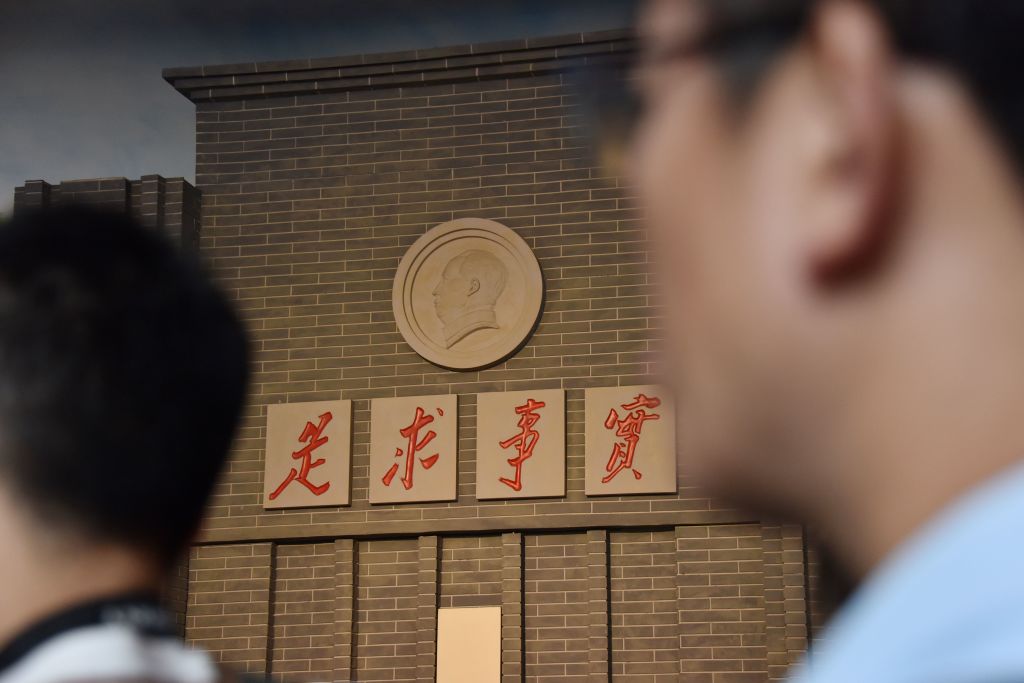What if it were uncovered that staffers for Foreign Office ministers had been flown out to Moscow for lavish grace and favour trips with Vladimir Putin’s underlings? Investigations would be launched and resignations hastily tendered. But we can expect no such outrage when China, not Russia, is the destination.
Why funnel money into tackling the CCP’s malign influence while investing in networking trips that fuel its propaganda machine?
The ‘Future Leaders Programme’ is organised by the Great Britain-China Centre (GBCC), a taxpayer-funded quango charged with encouraging ‘dialogue’ with China. According to parliament’s register of interests, staffers for Catherine West, then Foreign Office minister for the Indo-Pacific, and for David Lammy, the Deputy Prime Minister, have been flown out on such visits to China in the past two years, as well as at least one civil servant, a former aide to a Prime Minister and staffers for backbenchers. Neither West’s nor Lammy’s offices responded to my requests for comment.
The GBCC was founded by then foreign secretary James Callaghan in 1974 to ‘encourage greater non-governmental contact between the UK and China’. Today, as Xi Jinping’s rule becomes increasingly authoritarian, the GBCC’s claims that it is helping to foster ‘areas of legal reform, rule of law and good governance’ start to feel less like diplomacy and more like propaganda.
The GBCC’s newly appointed chair is Isabel Hilton. Hilton is a figure of the establishment: a veteran BBC broadcaster, ex-Guardian columnist and former editor of the website openDemocracy. That is not to say she has not faced her own scrapes with authority. She was placed on an MI5 ‘blacklist’ which barred her from a BBC role in 1976. She believed the intelligence services rendered her ‘guilty by association with a member of the Communist party at Edinburgh University’, until her blacklisting was withdrawn. Now she is back rubbing shoulders with controversial academics, having served as a visiting professor at King’s College London’s Lau China Institute since 2017. The institute, which receives 99.9 per cent of its funding from a tycoon linked to the Chinese Communist party (CCP), is directed by Kerry Brown, a former first secretary at the British embassy in Beijing, who once mused to a University College London audience that he would be ‘very happy’ if ‘the China model could be brought here and worked in Britain’. In 2020 he was named ‘person of the year’ by a Chinese government-owned thinktank for ‘telling Chinese stories and spreading Chinese voices’.
So what happens on the GBCC’s China trips in the name of improving ‘dialogue’? Hilton told me that as far as she is aware, Future Leaders Programmes ‘have never included… any CCP speakers’, yet guests on this trip are taken to Beijing’s Central Party School, which trains CCP cadres. The section of the GBCC website advertising its Future Leaders Programme does not say that visits to this school might be included, merely noting that some ‘participants and alumni may be invited to join GBCC’s bilateral Track 2 dialogues with counterparts in China’.
This year’s delegation even met Lu Kang, a vice-minister in the CCP’s International Department who dismissed reports of Uighur persecution as ‘defamatory rumours’. They also sat down with Dr Feng Zhongping, of the China Institutes of Contemporary International Relations, an outfit described in a CIA Open Source Center report as a ‘Soviet-style intelligence organ’.
These Future Leaders also attended a salon on ‘Telling China’s Story Well’, where Central Party School vice-president Xie Chuntao extolled the ‘advantages’ of China’s political system. This was a carefully stage-managed ideological pitch, designed to impress foreign guests with the CCP’s narrative.
One veteran China policy-watcher expressed worry that even sceptics risked having their heads turned by these programmes. ‘At one of its seminars in Oxford, scheduled prior to the Beijing visit, a British diplomat reportedly reassured a room full of these “future leaders” that she had been told by a “human rights expert” in China that all the [Uighur] concentration camps in Xinjiang had been closed,’ he tells me. ‘If this is the view expressed during the programme on British soil, I dread to think what the full Beijing visit entails.’
The skill of the Future Leaders trips, and others like them, is the way they encourage British talent to take up Beijing’s cause organically. ‘They are desperate to groom bright young westerners because they imagine they will be taken more seriously than people already perceived to have a vested interest, because they might be from China originally,’ the same source tells me.
Robert Clark, a defence fellow at the Yorktown Institute and former British Army linguist, believes that the GBCC programme is an ‘overt propaganda sham being invoiced to the British taxpayer’. ‘The GBCC programme claims to promote “dialogue” and “understanding”, but what they really mean is giving Beijing more airtime,’ he says. ‘This is the exact language used by the United Front, China’s global influence network seeking to co-opt people overseas to advance its agenda under the guise of cultural exchange – why is an arms-length body of our Foreign Office echoing it?’
The government may refuse to state publicly that China’s agenda is ‘hostile’, but it knows it to be true. Indeed, Beijing’s espionage and attempts to undermine Britain’s democracy recently prompted a £600 million increase in UK intelligence spending. Why funnel money into tackling the CCP’s malign influence while investing in networking trips that fuel its propaganda machine?
It is remarkable that aides to ministers and civil servants are participating in these schemes. Whitehall would not have dreamt of sponsoring ‘dialogue’ with the Kremlin in this way, today or during the Cold War. During the days of the Iron Curtain, such delegations were often run through obvious front groups or far-left unions, not state-backed quangos. At least then, even attendees knew they were being shown Potemkin villages. Modern China sells itself as prosperous, modern and inevitable – a far more seductive pitch than the Eastern Bloc could ever manage. But if we still value our traditions of liberal democracy, we must close our ears to this siren’s song.







Comments